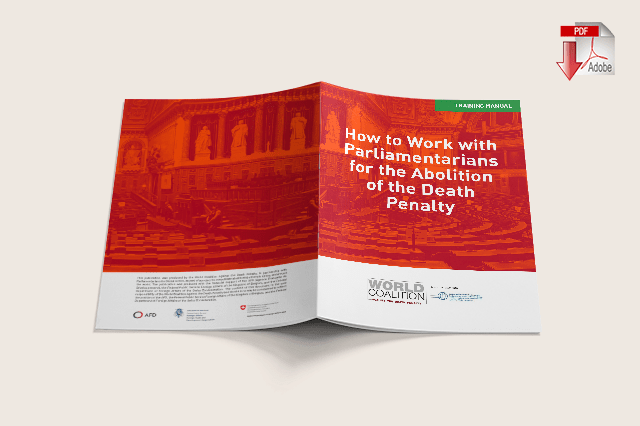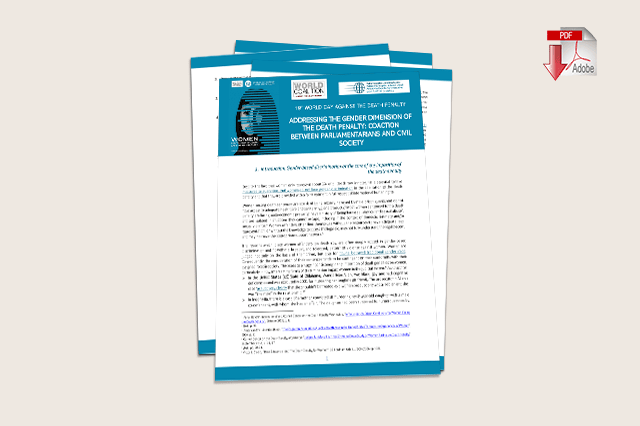On 20 October 2021, in commemoration of the 19th World Day Against the Death Penalty, Parliamentarians for Global Action (PGA) and the World Coalition for the Abolition of the Death Penalty (WCADP) held a joint virtual event to launch a how-to manual, drafted by both organizations, on “How to work with Parliamentarians on the Abolition of the Death Penalty.”
Moderated by the WCADP Program Manager, Ms. Bronwyn Dudley, the event was an excellent opportunity to, on the one hand, discuss how civil society organizations (CSOs) and other key stakeholders can engage with Members of Parliament to abolish the death penalty, and, on the other, to identify meaningful ways of advocacy to move forward in this respect.
The first panelist, Ms. Frederika Schweighoferova, PGA’s Senior Legal Advisor of the International Law and Human Rights Program and Director of the Rome Statute Campaign, gave a detailed overview of the how-to manual and its added value in the efforts to abolish the death penalty. This new guide should also be considered a companion to a Parliamentarian resource already published by the WCADP in 2014 (Parliamentarians and the Abolition of the Death Penalty), and whose primary audience is Parliamentarians as opposed to CSOs. The guide consists of two main parts: one focusing on explaining who the Parliamentarians are and their functions, and the other, aimed at developing concrete advocacy tools to work with them. In that respect, Ms Schweighoferova noted that Members of Parliament play a crucial role in abolishing the death penalty through four critical functions they can perform, namely:
- Parliamentarians can engage in the development and implementation of policies that can pave the way for the abolition, or reduction of the death penalty through debates, deliberations in parliament, and concrete actions taken with their peers;
- Parliamentarians can propose new laws through, for instance, private members’ bills by which they can achieve tangible results and impact on the abolition. This role is vital as they can reduce the scope of application of the death penalty, or to abolish it fully, pass official moratoriums on executions, secure higher legal standards in the process of the application of the death sentences, and propose amendments to legislation that are conducive to achieving the objective, such as promoting the ratification of international treaties;
- Parliamentarians are responsible for oversight, and they can hold the Government accountable once the legislation is passed while guaranteeing its correct implementation;
- Parliamentarians perform functions of representation. Besides representing their constituencies, they have access to public fora, through which they can advocate for the abolition of the death penalty.
The second part of the manual highlights several aspects that CSOs would need to consider in their advocacy efforts. It also explores ways to get involved with Parliamentarians. This includes, among others, prior and exhaustive research on the governance of the state; identifying and reaching out to different forms or parliaments (e.g., federal, state, national, sub-national, and regional parliaments); tips on how to convince the legislators to engage in this endeavor, how to maintain a long-lasting working relationship and how to engage them not only in the context of a national setting but also in their external relations with other states and organizations.
The introduction was followed by insightful remarks from a Parliamentarian perspective, by PGA Member and Chair of the National Group in Zimbabwe, Hon. Dorcas Sibanda, a fierce, committed human rights activist. Hon. Sibanda, who, in 2020, moved a motion in the National Assembly of Zimbabwe to abolish the death sentence, stressed that the death penalty denies the capacity of individuals to rehabilitate and contribute to a meaningful society, but most importantly, she stressed how fundamentally unfair and legally flawed the application of the capital punishment may be.
Considering the critical roles and functions Members of Parliament perform, it is vital that Parliamentarians themselves are involved and targeted in the advocacy efforts when safeguarding and protecting human rights. As Hon. Sibanda emphasized, despite legislators’ busy schedules, they still need to perform an oversight role to guarantee that the bill of rights - which lays down that every human being is entitled to the right to life - is always respected. Therefore, CSOs need to be mindful that they need to target those committees and areas where there is room and opportunity to interpret the question of the death penalty. Additionally, it is essential that Members of Parliaments are provided with working tools to understand the complexities of these issues as well as to advocate and raise awareness of these among themselves as there is a high level of misinformation surrounding the topic.
The guide has also been conceived as an essential tool that tailors advocacy efforts and showcases successful case studies for CSOs. In that respect, Ms. Noor Raja, Team Lead Policy and Advocacy of Justice Project Pakistan (JPP) expressed why Parliamentarians should participate in advocacy plans. In most countries, the path to abolition has barely come through public opinion alone. The discussion has always come through the judiciary which has taken the lead in this respect. It is therefore fundamental that legislators are conceived as allies and are equipped with representative data that informs them of (i) what the political costs of advocating for a particular reform or amendment are; (ii) what the benefits of such reform would be and also (iii) how politically convenient the reform would be for the legislators in question.
Accordingly, in her own experience working with Parliamentarians, the way to move forward is by pushing smaller and more achievable goals to attain incremental moves and progressions. Ms. Raja elucidated in greater detail the case study of the Juvenile Justice Act of 2018 and public hangings in Pakistan. As a means of their successful advocacy, JPP advised Parliamentarians and relevant committees on implications of the two matters under Pakistan’s international obligations and their domestic obligations established under its Constitution. To conclude the discussion, Ms. Raja mentioned that a wide variety of tools for CSOs is available to make progress with Parliamentarians. In that respect, it is crucial that organizations identify a viable first point of contact and generate the requisite and adequate level of interest in a particular area. Once this is accomplished, various strategies can follow, including the formulation and the dissemination of one page policy briefs or parliamentary questions to relevant committees – all taking into consideration each particular social and political context.




